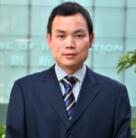Invited Speakers----Dr. Youhua Tan

Dr. Youhua Tan, Assistant Professor, Department of Biomedical Engineering, Hong Kong Polytechnic University, China
Speech Title: Shear stress regulates the mechanics and actomyosin-dependent viability and chemoresistance of circulating tumor cells
Abstract:
INTRODUCTION
Tumor cells metastasize to distant organs mainly through hematogenous dissemination. The frequency of circulating tumor cells (CTCs) in vasculature is correlated with poor prognosis and overall survival1,2. However, less than 0.01% of them can generate metastatic tumors in secondary sites, indicating the inefficiency of metastasis3. Nevertheless, metastasis accounts for over 90% of cancer-related deaths3, suggesting that a subpopulation of CTCs are able to survive the metastatic process and form metastases. Tumor cells experience considerable levels of shear stress in blood circulation, which is hypothesized to affect the survival and functions of CTCs. However, the influence of hemodynamic shear stress on the mechanics and chemoresistance of CTCs remains elusive. The roles of cell mechanics in the survival and drug resistance of CTCs in fluid shear flow are unclear.
METHODS
Human breast cancer cells were adopted. The corresponding cancer stem cells were selected by 3D soft fibrin gels. These cells were used for circulation in a microfluidic system under various shear stresses and circulation times. Cell viability was examined by MTS assay. The adhesion, spreading, and stiffness of surviving cells were examined by various assays. Actomyosin activity was modulated either by pharmacologic inhibition or activation via overexpressing constitutive active forms of plasmids. To explore the underlying mechanisms, the genes related to survival and drug resistance were quantified.
RESULTS AND DISCUSSION
In this study, we found that the majority of breast tumor cells in circulation could be eliminated by fluid shear stress, while cancer stem cells held survival advantages. Compared to untreated cells, tumor cells surviving shear stress exhibited unique biophysical properties: the adhesion of surviving tumor cells was significantly retarded; these cells exhibited elongated morphology, enhanced spreading, and up-regulated genes related to epithelial-mesenchymal transition; surviving tumor cells showed reduced F-actin expression and stiffness. Importantly, inhibiting actomyosin activity promoted the survival of circulating tumor cells in fluid shear stress, while activating actomyosin suppressed tumor cell survival. Soft surviving tumor cells held survival advantages in shear flow and higher resistance to chemotherapy. Inhibiting actomyosin activity in untreated cells enhanced chemoresistance, while activating actomyosin in surviving tumor cells suppressed this ability. These findings could be associated with the corresponding changes in the expressions of the genes related to multidrug resistance.
Our study unveils the regulatory roles of actomyosin in the survival and drug resistance of circulating tumor cells in hemodynamic shear flow, which suggest the importance of fluid shear stress and actomyosin activity in tumor metastasis.
Keywords: blood shear stress, circulating tumor cells, actomyosin, chemoresistance
ACKNOWLEDGEMENT
The study was financially supported by the Shenzhen Science and Technology Innovation Commission (JCYJ20170303160515987 and JCYJ20170413154735522).
REFERENCES
1. Alix-Panabières, C. & Pantel, K. Challenges in circulating tumour cell research. Nat. Rev. Cancer 14, 623–631 (2014).
2. Cristofanilli, M. et al. Circulating Tumor Cells, Disease Progression, and Survival in Metastatic Breast Cancer. N. Engl. J. Med. 351, 781–791 (2004).
3. Valastyan, S. & Weinberg, R. A. Tumor metastasis: molecular insights and evolving paradigms. Cell 147, 275–92 (2011).

